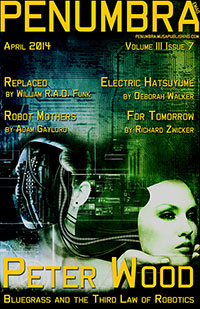Reviewed by Cyd Athens
This issue is a homage to Isaac Asimov.
In Richard Zwicker’s “For Tomorrow,” humans have been dead for hundreds of years. The robots that remain have sought out other planets in hopes of finding life as we know it. Meeting no success, they drill into Earth and find one man, Jason, a mountain climber who died in a climbing accident, whom they resuscitate. In a few billion years, our Sun will become a red giant. The robots have decided that they need human input to offer options for survival that may not have already been considered. The story feels incomplete and ends abruptly.
“Electric Hatsuyume” by Deborah Walker concerns a robot that is helping its mistress prepare for an Ōmisoka party. While the mistress yammers on about her dreams and expectations for the New Year, the robot has desires of its own. This tale is more evocative of Philip K. Dick’s Do Androids Dream of Electric Sheep? than it is of any of Asimov’s works.
Tackling the theme from a legal perspective, “Bluegrass and the Third Law of Robotics” by Peter Wood addresses the “what if” of Asimov’s Three Laws of Robotics. What if the laws were, in fact, legal contracts rather than just programming limitations? Cecil, appointed as a Public Defender to a robot accused of a crime—running a Three Card Monte scam in Boone, North Carolina—is in a quandary when the robot, Roy, suggests that since the Three Laws of Robotics don’t apply to humans, maybe human laws don’t apply to robots. Unfortunately, the story feels bloated by taking on Cecil’s relationship with his wife, Roy’s love of bluegrass music, and the relationships Roy has with others.
Training one’s replacement for a job is one thing. William R.A.D. Funk takes this to a new level in “Replaced.” Here, Yin Tong is a worker who solders parts all day. His current project requires 400 parts. As we begin the story, he is working on part 378. After he finishes part 379, he is called into his supervisor’s office and given the opportunity to retire. Insulted, he refuses and goes back to work determined to work harder and faster so that his advanced age is not seen as a weakness. He increases his pace and finishes all 400 of his parts before once again being summoned by his supervisor. This time, there is no option; he is told that he is to be retired. Worker Three-Seven, a robot to which Yin’s 400 parts contributed, is to replace Yin—the last human worker in the factory. The tale marches toward an inevitable ending that makes Yin’s final insight seem pointless rather than poignant.
“Robot Mothers” by Adam Gaylord is a tasty morsel that broaches the issues of how robot procreation is or is not in keeping with the Three Laws of Robotics. When a robot reports to the International Robotics Corporation (IRC) because its two mothers, who had become outmoded, expected it to, Mr. Nash, Mr. Klein, and Ms. Holand are not sure what to do with the robot. An interview with the robot does little to help them decide. Of the stories in this issue, this fun tale has the most Asimovian feel to it.
Cyd Athens indulges a speculative fiction addiction from 45ø 29 30.65 N, 122ø 35 30.91 W.
 Penumbra #31, April 2014
Penumbra #31, April 2014